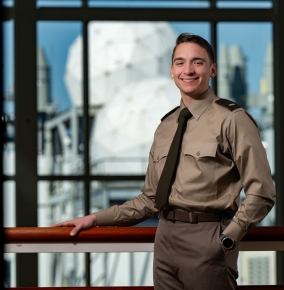Nolan Pearce

What was your path to pursuing the Military Fellows Program at the Laboratory?
After graduating from West Point in May 2022 with a BS degree in electrical engineering and a minor in space science, I came to Lincoln Laboratory in July as a newly minted second-lieutenant cyber officer. I decided to continue my education at Northeastern University, pursuing an MS degree in electrical engineering. During college, I had participated in independent research and collaborative capstones, and I felt the Laboratory would offer similar experiences at a much higher level of research. I believe that research complements my graduate courses well and allows me to fully apply what I have learned.
What are you working on, and what does your schedule look like?
Working full time over the summer has allowed me to dive deep into two or three projects and produce tangible results by the fall semester. My group — Tactical Networks — specializes in both radio-frequency communications theory and its applications, which summarizes my typical workload. Usually, I split my time 50/50 between simulation and development. I spend mornings creating virtual network links, analyzing data rates, and using software-defined radios for useful technical analysis. My afternoons are often spent working on decision and estimation theory in MATLAB or with just a notebook. My goal is to optimize antenna arrays or receiver networks to communicate longer, faster, and more discreetly.
Lincoln Laboratory is an enriching workplace. I’ve attended technical seminars to see some of the broader ongoing work here and have taken an internal course in radar theory.
From your experience, what is the benefit of having military officers working alongside scientists and engineers?
As a cyber officer, I find that my Army career aligns closely with my experience as an engineer at the Laboratory. I develop bleeding-edge systems my soldiers and I will use; the Laboratory offers extrinsic and intrinsic reward to serve the technical needs of the Army and educate me as a STEM-focused leader. Sometimes our Laboratory sponsors are even former classmates (and former Military Fellows) in their respective Army units.
My position as a Military Fellow means I can interface between our tactical, application-focused sponsors and our theory-minded developers. I can help both sides communicate and work toward each other’s needs. These conversations will serve as a great reference when I have my own technologies and soldiers to manage.
Who or what inspires you?
My coworkers inspire me. A federally funded research and development center such as Lincoln Laboratory attracts smart, selfless, research-focused engineers. I am impressed every day not only by the sheer engineering ability and commitment of my associate staff peers but also by the leadership skills and initiative of more senior technical staff.
What are your favorite hobbies?
I enjoy almost all endurance sports and keep myself busy year-round with competitive New England races; I race triathlons in the summer, train for marathons in the fall and spring, and recently started ski mountaineering in the White Mountains over the winter. Aside from sports, I play jazz and classical piano as a burgeoning amateur. I also have a ham radio license to put my electrical engineering theory into practice.